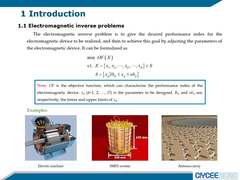A Modified Whale Optimization Algorithm for Electromagnetic Inverse Problems
ID:26
Submission ID:1038 View Protection:ATTENDEE
Updated Time:2020-10-26 16:50:30
Hits:624
Oral Presentation
Abstract
Whale optimization algorithm (WOA), inspired from the natural hunting behavior of humpback whales, is a stochastic searching algorithm for electromagnetic inverse problem and other optimization problems. However, the algorithm may converge very slowly and the exploration reliability of it needs to be improved when dealing with multimodal and complex problems. Thus, some improvements are introduced. Initially, a farthest individual first dynamic topology (FIFDT) is put forward to better balance the exploration and exploitation searches. Additionally, an adaptive fully informed learning mechanism (AFILM) is applied to avoid premature convergence or the decrease of convergence speed. Meanwhile, a gradient descent based accelerated search (GDBAS) is adopted to improve the convergence speed of the algorithm. Finally, a chaotic map based population mutation (CMBPM) is added to enhance the exploration capability in order to find the global optimum solution. Experiments have been conducted on well-known multimodal benchmark test functions and an electromagnetic inverse problem. The numerical results show the merit and efficiency of the proposed modified WOA.
Keywords
Electromagnetic inverse problem;optimization problem;stochastic searching algorithm;whale optimization algorithm (WOA)
Submission Author
Boqun Li
College of electrical engineering; Zhejiang University
Jiaqiang Yang
College of electrical engineering; Zhejiang University

Comment submit